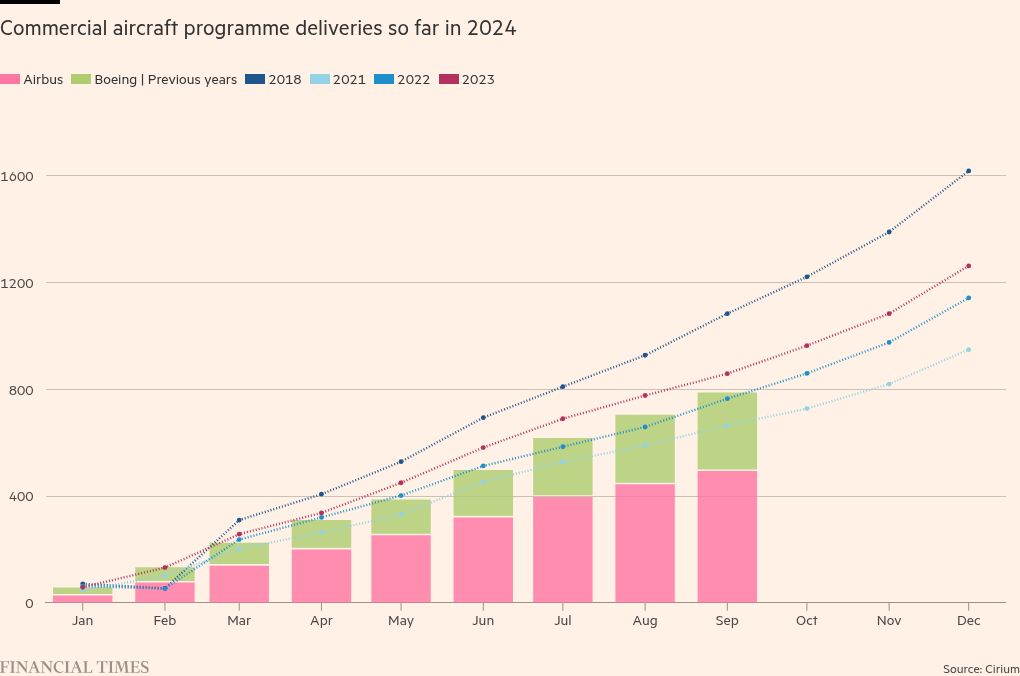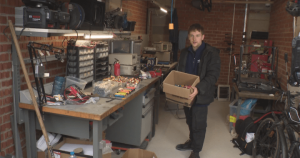Boeing strike woes ripple through aerospace supply chain

Unlock the Editor’s Digest for free
Roula Khalaf, Editor of the FT, selects her favourite stories in this weekly newsletter.
Boeing’s withdrawal of its pay offer to striking workers has threatened to compound the financial woes of the US plane maker and heap more pressure on the industry’s stretched supply chain.
With the strike of the company’s 33,000 machinists heading into its fourth week and production of its bestselling 737 Max and 767 and 777 planes on hold, the costs to the company are mounting with S&P Global Ratings warning they could hit about $1bn a month.
The stalemate between the group and members of the International Association of Machinists and Aerospace Workers District 751 (IAM), who first walked out last month, sent the company’s shares 2 per cent lower by Wednesday lunchtime in New York.
“We’re now almost at the one-month mark [in the dispute], and that is the point where it starts to get serious,” said Robert Stallard, analyst at Vertical Research Partners.
Boeing could be forced to take more “extreme measures” to reduce cash burn, including “lay-offs and cutting back suppliers”, he added.
“That then ripples down through the supply chain which was already in a fragile state as [Airbus and Boeing] had been trying to ramp up.”
S&P on Tuesday warned a possible downgrade of Boeing’s debt into junk territory — a major embarrassment for one of US’s leading companies — was possible, adding the strike puts the jet maker’s “recovery at risk”.
The latest worries about Boeing came as European rival Airbus revealed commercial aircraft deliveries in September fell 9 per cent — underscoring the wider challenges in the supply chain. Airbus said it handed over 50 jets, a drop of 9 per cent compared with the same month last year.
The figure brings deliveries this year to 497 aircraft, leaving the company with an uphill task to meet its end-of year delivery target of “about 770” jets.
Airbus usually accelerates output in the final quarter of the year but analysts said reaching its target would be a stretch.
Even before its latest pay offer was rejected by the machinists, Boeing had said it would stop most purchase orders with companies that supply the affected jetliner programmes and introduced temporary furloughs for some employees.
The company has been burning through cash as it struggles to recover from the mid-air blowout of a section of the fuselage of one of its Max aircraft in January. The accident exposed lapses in its manufacturing and poor safety controls.
Boeing’s problems are bleeding out to the wider supply chain that has struggled to bounce back from the Covid-19 pandemic and meet resurgent demand from airlines.
On Airbus, Rob Morris, head of Cirium’s consultancy business Ascend, said if the group maintained the delivery pace they had shown this year, then “around 750 looks more likely”.
Airbus’s monthly output is being closely watched by the industry. The company in June cut its delivery goal for the year from 800 to 770, citing problems with securing aircraft interiors as well as engines.
One casualty highlighting the supply chain problems is Britain’s Senior, which this week warned it would have to cut headcount and curtail discretionary spending.
The FTSE 250 aerospace group, which supplies fuel ducts, valves and other parts that connect aircraft structures to Boeing and Airbus, blamed the strike at the US company and supply chain issues at its European rival for its woes.
One of its customers “significantly” reduced scheduled deliveries in the fourth quarter because of the strike.
Boeing’s Max aircraft represented about 8 per cent of Senior’s aerospace revenues, according to the company’s most recent results, while the 777 accounted for about 2 per cent.
Analysts said the Boeing strike was unlikely to threaten the health of larger, well-capitalised suppliers but warned smaller groups could be at risk.
Nick Cunningham, analyst at Agency Partners, said larger players might have to step up.
“We think the top-tier suppliers will need to help out the mom and pops, probably by continuing to take a base level of parts even if they go into inventory, so the small guys do not suffer a sudden hole in their cash flows.”
#Boeing #strike #woes #ripple #aerospace #supply #chain






